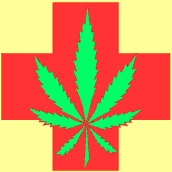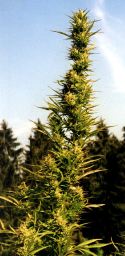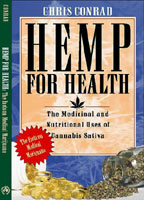
Medical
Marijuana
Health care that is safe, effective,traditional,natural, affordable...
and illegal under federal lawA number of States, however, have voted to allow medical marijuana cultivation and possession by patients and their designated caregivers.

|

Cancer patient |

|

|
Chrons Disease |
Post Traumatic Stress Disorder |
|

|
|
 Cannabis,
the True Hemp:
Cannabis,
the True Hemp:
Cannabis sativa, L.
Safe, Effective, Natural Medicine
The medical use of the cannabis plant goes back at least 5,000 years to ancient China, where the emperor Shen Nung listed it in his classic pharmacopeia, the Pen Ts'ao. It is also listed in the medical works of India including the famous Hindu surgeon Susruta, and the Roman physicians Pliny and Galen. Most of the herbal guides of the Moslem and European cultures also gave frequent reference to its medical value, and cannabis was one of the world's primary medicines for millenia on end.
Used by most of the world's cultures for its healing properties, there was a tremendous burst of medical research in the 19th century. Cannabis was listed in medical texts of the last century as a treatment for over 100 different health conditions, and Queen Victoria's personal physician wrote in praise of its therapeutic value. When the ban was proposed in 1937, the AMA went before Congress to oppose the law and specifically protested that the Marijuana Tax Act was a fraud because the plant's scientific name is Cannabis sativa, its English name is True Hemp, and no one at the time knew that the ban would affect the essence of medicine, agriculture and industry -- until it was too late.
Access to effective medicine and quality health care are listed as fundamental human rights in the UN Universal Declaration of Human Rights. Medical use is specifically allowed by the Single Convention Treaty. It is cruel to deny sick and dying people this effective medicine and inhumane to punish patients whose very quality of life depends on access to cannabis.
Some Therapeutic Applications of Cannabis
- Arthritis
- Migraine headache
- Glaucoma (blindness)
- Cancer
- Epilepsy
- MS
- Asthma
- Cramps
- AIDS / HIV
- Spinal injury
- Stress
- Wasting syndrome
- Pain control
- Depression
- Muscle spasms
- Insomnia
Federal Denial of Medical Research
Cannabis is one of the most studied plants in the history of humanity and "one of the safest therapeutic agents known to mankind," in the words of DEA administrative law Judge Francis Young. He ruled in 1988 that marijuana has been proven to have medical benefits for certain maladies.
Hundreds of studies have been done on cannabis. The British scientific journal Lancet reviewed the data and stated in 1995 that "The smoking of cannabis, even long term, is not harmful to health," and called for legal reform. The international Society of Neuroscience and the British Medical Association reported in 1997 that they had identified specific medical compounds in cannabis.That same year, the Journal of the AMA (American Medical Association) published a commentary calling for more aggressive study of the medical value of marijuana, and the New England Journal of Medicine urged that doctors be allowed to prescribe marijuana. The UN World Health Organization reported in 1998 that cannabis is safer than tobacco or alcohol, and there is still not one recorded death from cannabis overdose in medical history (aspirin kills about 1,000 people in the US each year). The National Academy of Science is conducting a review of the medical data, including personal medical case histories. Its report is expected to be released in early 1999.
Despite all this, federal officials across the board claim that we need more 'recognized studies' before they can stop arresting sick people. The problem is that they also refuse to recognize existing studies and have blocked repeated attempts to do new studies. These officials have no such trouble, however, repeating sensational and spurious claims of alleged harm from marijuana, even though the claims are hypothetical and the data unproved or even known to be wrong.
In an ominous move in 1998, a group of Republican Congressmen got the House Judiciary Committee to consider a bill asserting that no matter what the scientific research shows, the US should criminalize and punish all cannabis use, medical or otherwise. The bill passed in watered down form, but ironically they called it a "Sense of Congress" resolution. Obviously, it's just more nonsense of Congress.
Getting Medical Marijuana
When scientific research in the 1970s showed tremendous new potential for cannabis as a medicinal herb with a number of promising extracts, Congress created a special program, the Compassionate Investigational New Drug (IND) Program, to permit research and medical use. When the DEA refused to comply, both federal DEA Administrative Law Judge Francis Young and an appeals court ruled against the agency. Nonetheless, when the DEA appealed that decision, the program was shut down by the Bush administration on a legal technicality. Not only has Clinton failed to restore it, he has had his agencies harrass and threaten patients and doctors alike who see the need to use cannabis for relief.
In response to the federal ban, legislatures of 37 states have passed bills in support of medical marijuana. Despite their illegality, Cannabis Buyers Clubs have sprung up around the country to provide medicine to patients. In several cases, including California's Brownie Mary, Dennis Peron, David Herrick, Marvin Chavez, Peter McWilliams, Steve McWilliams, Bryan Epis, Scott Imler, Lynn and Judy Osburn, Valerie and Michae Corral and The Green Cross Buyers Club in Washington State, providers themselves have been selectively targeted, arrested and prosecuted for their merciful relief work.
In 1996 more than 750,000 California voters signed a petition to place medical marijuana on the state ballot. Despite a dirty campaign against it, waged largely at taxpayers expense by government officials who raided two campaign offices in a desperate crackdown on medical marijuana patient buyers clubs before the election, Proposition 215 passed by 56% in November 1996, with more than 5 million 'Yes' votes: more votes than any other voter initiative, and more state votes than any elected official &endash; including Bill Clinton or any other presidential candidate. It is now Health and Safety Code 11362.5 in the state lawbooks. The courts have ruled that the doctor's freedom of speech does allow them to recommend marijuana to their patients, but the DEA has stymied all efforts to create any legal, functional distribution program, citing the federal authority based on the Commerce Clause. The largest such patient dispensaries in the state, the San Francisco CBC, run by Peron, and the Oakland CBC, were closed by court injunction despite strong community and municipal support, but numerous smaller clubs continue to operate throughout the state. Oakland continues to fight to reopen for patients.
A broader initiative passed with 65% of the vote in Arizona: Proposition 200 not only allowed the medical use of marijuana, it included other drugs such as the psychedellics as well; but the state legislature overturned the measure in an attempt to override the will of the voters. Citizens later filed a referendum for the 1998 ballot, putting the issue in limbo until it could be reaffirmed.
Subsequently, Americans for Medical Rights was formed to bring the issue to other states. In 1998, five state medical marijuana initiatives were passed with an average of 60% support in the states of Alaska, Washington, Oregon, Nevada and Arizona. All of these initiatives include personal cultivation by patients for their own use as part of the process. Government officials have blocked the counting of votes in two other areas where medical marijuana initiatives were also passed; in Colorado and Washington DC. Exit polls show that the vote in DC was nearly 70% in favor of passage. This fits in with a 1998 plan announced by the UN Office of Narcotic Control Policy. The interantional bureaucracy issued an official report stating that medical marijuana, industrial hemp, public elections and free speech all threaten their plan to destroy all global drug using cultures and their gardens within 10 years
In California today, patients are growing marijuana for their relief, clubs continue to operate to provide medicine, and hardline police and prosecutors continue to arrest and file charges against patients, leaving it up to the juries to act in the interest of justice and acquit. Drug War hardliner and former District Attorney Dan Lungren met a humiliating defeat at the polls in his attempt to become governor when he promised to prolong and expand his war on marijuana. California Attorney General Bill Lockyer was a supporter of Prop 215 and has promised to see to it that the measure is implemented in the way voters intended. He has run up against a roadblock in federal law, however.
The voters of Maine voted overwhelmingly in support of medical marijuana in 1999, the same year that the National Academy of Science / Institute of Medicine released its report showing a rich potential and low risk for medicinal use of this natural herb (although the report mentioned the medical establishment's opposition to smoking). An initiative passed on the state ballot in Nevada in 2000, the Hawaii state legislature passed a bill, and numerous other changes have been made at the state level, but the DEA and federal legislators refuse to budge. The Congress even voted to block the implementation of a law passed by 79% of voters in Washington DC, out of sheer cruelty. In the meantime, patients across America are still victims of government law enforcement officials who are practicing medicine without a license.
 For
more information on medical marijuana and the other
therapeutic uses of the cannabis hemp plant, read Hemp
for Health by Chris
Conrad. Available for $19,
including postage and handling.
For
more information on medical marijuana and the other
therapeutic uses of the cannabis hemp plant, read Hemp
for Health by Chris
Conrad. Available for $19,
including postage and handling.
Mail check to:
Creative Xpressions, PO Box 1716,
El Cerrito CA 94530 USA,
or call 510-215-8326 to order your copy today.
Toll free credit card orders: 866-292-6657
POW Gallery
